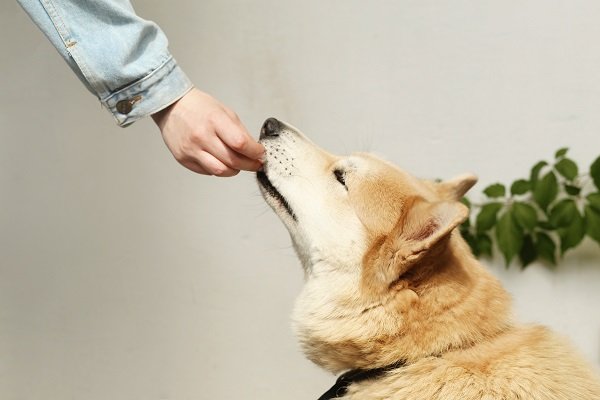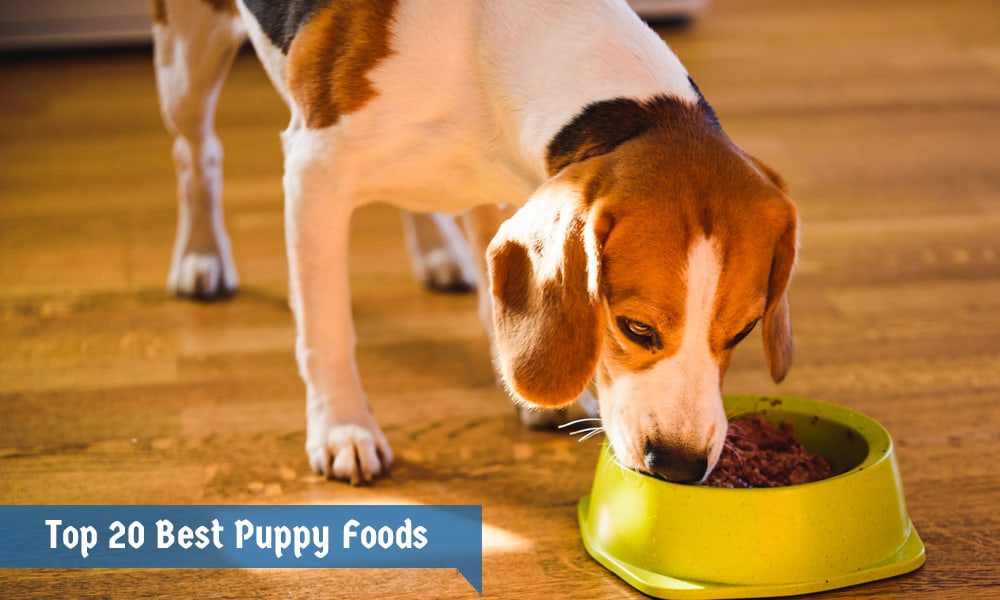Your dog may have tummy woes or stomach issues for a variety of reasons, but when your dog starts acting like it doesn’t feel well, it’s important to try to figure out the root of the problem and do what you can to fix it. In many cases, switching to a different type of puppy food can help.
But how do you know if your dog is experiencing simple upset stomachs or if there’s something else going on? Today, we’re going to take a look at causes for sensitive stomachs, the signs you should look for in your dog, and what is the best dog food for dogs with sensitive stomachs.
Contents
How do I know if my puppy has a sensitive stomach?

You might be able to tell that something is bothering your puppy or dog, but it isn’t as if a dog can tell you about sensitive stomachs. If you pay attention, though, you will notice that your dog is giving you a lot of clues about its stomach issues. You just have to know how to interpret them. (Don’t worry, the clues for sensitive or upset stomachs are pretty straightforward.)
The clearest signs of dogs with sensitive stomachs are if they begin to vomit or has diarrhea. These are the body’s ways of getting rid of things that shouldn’t be there. Some people think that vomiting and diarrhea in a dog are in and of themselves bad things, but they’re not. They are defense mechanisms used by the body to protect it from harmful things entering the GI tract.
Other signs you may notice in dogs with sensitive stomachs or food allergy are:
- Poor or decreased appetite
- Not drinking enough water
- Fatigue
- Malaise
- Gulping
- Licking their lips or other objects
- Sticking their tongues in the air
- Disinterest in activities they once enjoyed
- Frequent stretching or appearing uncomfortable
When to Call the Vet
When dogs or puppies have sensitive stomachs, keeping a close eye on them is important. Dogs, especially puppies, can easily become dehydrated, and stomach issues may be a sign of a significant problem, including bloat, pancreatitis, parasitic infection, or allergic reaction. Here are some signs that it’s time to call your vet:
- More than one episode of vomiting or diarrhea
- Blood in the vomit or stool
- Increasing discomfort
- Foreign object in stool or vomit
- Weakness
- Collapse
If you are relatively confident that your dog’s sensitive stomach is the result of something you know they ate but shouldn’t have, either because you saw it happen or you think you did, call your vet or an emergency vet service immediately. If you suspect your puppy or adult dog ate anything poisonous or toxic that is causing its upset stomach, call the Animal Poison Control Hotline at 888-426-4435.
Why does my puppy have a sensitive stomach?

Many things can cause sensitive upset stomachs in puppies and dogs.
The most common cause of an upset stomach is that your dog ate something it wasn’t supposed to. Dogs, especially puppies, are curious and one of the tools they have to learn about the world is their mouths. If dogs lick, chew on, or ingest the wrong thing, it can lead to upset stomachs which will then cause vomiting, diarrhea, or both.
Other possible causes of sensitive stomachs in dogs are:
- An imbalance of bacteria in the GI tract
- Food allergies and sensitivities
- Emotional distress or anxiety
Dogs can develop sensitive stomachs at any time, but puppies and dogs older than 7 years of age are most at risk. Some dog breeds are more susceptible to stomach issues, too, including Yorkshire terriers, Great Danes, German Shepherds, Irish Setters, and Shar Peis. In breeds with sensitive digestive systems, the ingredients of their food are really important.
Some ingredients in dog food may cause food allergies, but most dog people assume that ingredients like grains or canola meal cause digestive system issues. The truth is that proteins are the bigger culprits. Animal proteins that your pet eats regularly can eventually lead to tummy issues and immune system problems.
Home Remedies
If your pup’s sensitive stomach is a one-time thing, there are a few things you can do to try to help it feel better. Remember, you should always consult your vet before trying any home treatment for your dog’s sensitive stomach.
- Fasting. Remember that vomiting and diarrhea are the body’s natural way of getting rid of things that shouldn’t be there and a normal reaction to a sensitive stomach. But once this action starts, it can be hard to get it to stop. Fasting can help because it lets your dog’s tummy rest. Again, it is very, very important to talk to your vet before trying to fast your dog, especially small and toy breeds and dogs who are prone to low blood sugar issues and will not be able to tolerate it.
- Ice cubes. Ice cubes are a good way to keep your dog hydrated when they have a sensitive stomach, especially if it is resisting drinking water. Too much water too fast can cause more problems. Start with ice cubes and work up to small sips of water.
- Canned pumpkin. Why canned pumpkin? It’s packed with nutrients and water, and the body absorbs it slowly, which can help ease an upset stomach. Remember, you should only feed 100 percent natural canned pumpkin to your dog, not pumpkin pie filling. For a small dog around five pounds or so, start with a 1/2 teaspoon. For a large dog, use closer to 75 pounds can typically a tablespoon.
What is the best dog food for puppies with sensitive stomachs?

If your dogs are showing signs of a sensitive stomach, choosing the right dog food is key to keeping them comfortable and healthy. Always choose dog food made with high-quality ingredients and avoid fillers and carbs like corn, wheat, and soy. Sometimes, a limited ingredient diet is necessary for your pup, but not always. Look for foods with novel proteins, like salmon, and consider a limited ingredient option.
Continuing to feed a dog with a sensitive stomach low-quality dog food can lead to a significant nutritional or health issue. Chronic digestive system issues can from a sensitive stomach lead to malnutrition as your pup’s body isn’t absorbing all of the nutrients it needs to function properly. Over time, this can cause pancreatitis, heart disease, kidney disease, pancreatitis, and diabetes.
If you’re looking for dog food for a sensitive stomach, here are some of the best options on the market.
Blue Buffalo Basics Limited Ingredient
Blue Buffalo is a creator of high-quality dog food recipes, and for dogs with sensitive stomachs who require limited ingredient diets, Blue Buffalo Basics Limited Ingredient dog food is worth a closer look. This recipe features real deboned turkey instead of chicken as the main animal protein and uses potatoes as a source of healthy and easily digestible carbs. Omega fatty acids support healthy skin and coat, and Blue Buffalo included DHA for brain and eye development.
If you’re familiar with Blue Buffalo, you probably know about its LifeSource Bits. These cold-formed highly potent bits are rich in antioxidants, vitamins, and minerals to help your puppy grow strong and healthy.
This Blue Buffalo Basics limited ingredient diet dog food has no artificial flavors or preservatives and does not contain any chicken protein or poultry by-product meals or artificial colors, flavors, or preservatives, so it’s a great option for a sensitive stomach. It’s also free from carbs like wheat, corn, and soy, things that aren’t good for any dog, much less a pet with a sensitive stomach. It contains 26 percent crude protein, 15 percent fat, and 349 kcal/cup.
The full ingredient list items for this limited ingredient dog food is as follows: Deboned Turkey, Turkey Meal, Oatmeal, Peas, Ground Rice, Potatoes, Natural Flavor, Pea Protein, Canola Oil (source of Omega 6 Fatty Acids), Flaxseed (source of Omega 3 Fatty Acids), Pea Fiber, Fish Oil (source of ARA-Arachidonic Acid and DHA-Docosahexaenoic Acid), Salt, Dehydrated Alfalfa Meal, Choline Chloride, Dicalcium Phosphate, Pumpkin, Dried Chicory Root, Potassium Chloride, Alfalfa Nutrient Concentrate, Calcium Carbonate, Vitamin E Supplement, preserved with Mixed Tocopherols, L-Threonine, L-Ascorbyl-2-Polyphosphate (source of Vitamin C), Zinc Amino Acid Chelate, Zinc Sulfate, Vegetable Juice for color, Ferrous Sulfate, Iron Amino Acid Chelate, Blueberries, Cranberries, Barley Grass, Parsley, Turmeric, Dried Kelp, Yucca Schidigera Extract, Niacin (Vitamin B3), Calcium Pantothenate (Vitamin B5), Copper Sulfate, Biotin (Vitamin B7), L-Lysine, Vitamin A Supplement, Copper Amino Acid Chelate, Manganese Sulfate, Taurine, Manganese Amino Acid Chelate, Dried Yeast, Dried Enterococcus faecium fermentation product, Dried Lactobacillus acidophilus fermentation product, Dried Aspergillus niger fermentation extract, Dried Trichoderma longibrachiatum fermentation extract, Dried Bacillus subtilis fermentation extract, Thiamine Mononitrate (Vitamin B1), Riboflavin (Vitamin B2), Vitamin D3 Supplement, Vitamin B12 Supplement, Pyridoxine Hydrochloride (Vitamin B6), Calcium Iodate, Folic Acid (Vitamin B9), Sodium Selenite, Oil of Rosemary.
CANIDAE All Life Stages Lamb Meal & Rice Formula Dry Dog Food
This lamb meal and rice recipe from CANIDAE isn’t specifically formulated for puppies, but the recipe is suitable for any dogs with sensitive stomachs at all life stages. The kibble is small enough that most dogs and puppies can handle it fine, but it may not be a good size for small or toy breeds.
The vet-formulated dog food recipe is made with premium ingredients like lamb for animal protein, brown rice, and barley. It contains no wheat, soy, or corn and is loaded with antioxidants for immune system health, omega 3 fatty acids to support coat and skin health, and a trio of probiotics for proper digestion.
What we really like about this limited ingredient dog food product because you don’t have to worry about transitioning your puppy to adult dog food as they mature, which can be tricky with a sensitive stomach. Since this recipe is for all life stages, you can just increase the amount you give with each meal the appropriate amount. Changing dog food can be hard on a pup with. a sensitive stomach. With CANIDAE All Life Stages, you don’t have to worry about it. Plus, it uses a novel protein, which can help avoid protein sensitivities in the future.
This best dog food recipe’s ingredients 23 percent crude protein, 12.5 percent crude fat, and 468 kcal/cup.
The complete ingredient list for this dry dog food is as follows: Lamb meal protein, brown rice, cracked pearled barley, rice bran, peas, millet, canola oil, lamb protein, tomato pomace, natural flavor, flaxseed, salmon oil, choline chloride, salt, potassium chloride, sun-cured alfalfa, inulin (from chicory root), lecithin, sage extract, cranberries, beta-carotene, rosemary extract, sunflower oil, yucca schidigera extract, dried enterococcus faecium fermentation product, dried lactobacillus acidophilus fermentation product, dried lactobacillus casei fermentation product, dried lactobacillus Plantarum fermentation product, dried Trichoderma longibrachiatum fermentation extract, vitamins (vitamin E supplement, thiamine mononitrate, ascorbic acid, vitamin A supplement, biotin, niacin, calcium pantothenate, pyridoxine hydrochloride (vitamin B6), vitamin B12 supplement, riboflavin, vitamin D3 supplement, folic acid), minerals (iron proteinate, zinc proteinate, copper proteinate, ferrous sulfate, zinc sulfate, copper sulfate, potassium iodide, manganese proteinate, manganous oxide, manganese sulfate, sodium selenite), mixed tocopherols (a preservative), papaya, pineapple. Contains a source of live naturally occurring microorganisms.
Hill’s Science Diet Puppy No Corn, Wheat, Soy Dog Food
Although this dry dog food recipe from Hill’s Science Diet contains chicken ingredients, it is free from corn, wheat, and soy. If your puppy is sensitive to these grains, this recipe is worth a closer look. Protein allergies usually develop over time, so it may not be the chicken that’s causing your puppy’s sensitive stomach.
This limited ingredient dog food from Hill’s Science Diet dry dog food is packed with everything your little pup needs to grow strong and healthy. It’s balanced with ingredients for the development of strong bones and teeth and to support lean muscle development. Other benefits include DHA for brain and eye development and added amino acids, vitamins, and amino acids for immune system health.
Hill’s Science Diet Puppy ingredients contain 29 percent crude protein, 22 percent fat, and 434 kcal/cup.
The full ingredient list for this dry dog food for sensitive stomachs is as follows: Chicken Protein, Brown Rice, Whole Grain Oats, Cracked Pearled Barley, Chicken Meal, Pea Protein, Chicken Fat, Flaxseed, Egg Product, Chicken Liver Flavor, Dried Beet Pulp, Dicalcium Phosphate, Lactic Acid, Fish or Salmon Oil, Iodized Salt, Potassium Chloride, Choline Chloride, Green Peas, Apples, vitamins (Vitamin E Supplement, L-Ascorbyl-2-Polyphosphate (source of Vitamin C), Niacin Supplement, Thiamine Mononitrate, Vitamin A Supplement, Calcium Pantothenate, Vitamin B12 Supplement, Pyridoxine Hydrochloride, Riboflavin Supplement, Biotin, Folic Acid, Vitamin D3 Supplement), Cranberries, Carrots, minerals (Ferrous Sulfate, Zinc Oxide, Copper Sulfate, Manganous Oxide, Calcium Iodate, Sodium Selenite), Taurine, Broccoli, Mixed Tocopherols for freshness, Natural Flavors, Beta-Carotene.
NUTRO NATURAL CHOICE Puppy Dry Dog Food
Nutro Natural Choice is another good limited ingredient dog food to try for a puppy with stomach sensitivity. This dry dog food recipe is chicken-based, so it may not be appropriate if chicken is what causes your puppy’s issues. That said, the ingredients do not include unhealthy carbs like corn, soy, and meat With DHA for brain and eye development and calcium to support strong bones and teeth, this recipe uses only non-GMO ingredients sourced from trusted suppliers and farmers.
This clean dog food contains ingredients that are 28 percent crude protein, 16 percent crude fat, and 390 kcal/cup. (There is also a large breed puppy recipe available with ingredients that are 26 percent crude protein, 14 percent crude fat, and 379 kcal/cup.)
The full ingredient list for this dry dog food for sensitive stomachs is as follows: Chicken Protein, Chicken Meal, Whole Grain Barley, Brewers Rice, Whole Grain Brown Rice, Potato Protein, Chicken Fat (preserved with Mixed Tocopherols), Rice Bran, Natural Flavor, Dried Plain Beet Pulp, Fish or Salmon Oil (preserved with Mixed Tocopherols), Salt, Potassium Chloride, Choline Chloride, Citric Acid (preservative), Mixed Tocopherols (preservative), Chia Seed, Dried Coconut, Dried Tomato Pomace, Dried Egg Product, Dried Pumpkin, Dried Kale, Dried Spinach, Vitamin E Supplement, Ferrous Sulfate, Zinc Oxide, Sodium Selenite, Ascorbic Acid (Vitamin C), D-Calcium Pantothenate, Manganese Sulfate, Copper Sulfate, Biotin, Thiamine Mononitrate (Vitamin B1), Vitamin B12 Supplement, Vitamin A Supplement, Niacin Supplement, Riboflavin Supplement (Vitamin B2), Pyridoxine Hydrochloride (Vitamin B6), Vitamin D3 Supplement, Manganous Oxide, Potassium Iodide, Folic Acid, Rosemary Extract.
How to Switch Your Puppy to a New Food

For a dog with a sensitive stomach, you have to take your time switching from one dog food to another because the change in ingredients can cause more issues if your pet has a sensitive stomach. The best approach is to tackle it in a slow, methodical way so you can monitor how well your pet is tolerating the change in ingredients.
To begin, you’ll need some of both dog foods. Every day, you will give your dog a blend of old and new dog food, slowly increasing the amount of new food you give your dog and decreasing the amount of old dog food until your phase out the old dog food altogether. Most vets recommend starting with 10 percent of the new dog food and 90 percent of the old dog food and increasing the amount of new food by about 10 percent every day. So, on day two, use a 20/80 mix of new to old. One day three, use 30/70; day four, 40/60, and so on until your puppy is eating only the new dog food.
Monitor your puppy to see how it’s responding to the new ingredients and adjust dog foods as needed. If it’s handling the change between the dog foods well, you can speed up the process a bit. If they’re having a difficult time, stop advancing the new food and stick with the current mix of food for a few days. Then, try again. Pay attention to your dogs and use your judgment to determine what they need as you transition from one food to the other.
When Your Puppy Grows Up
Sometimes, your dog may outgrow its food sensitivities, and ingredients that once caused problems won’t anymore. Sometimes, a particular ingredient will bother your pet for its whole life. If your dogs continue to have problems into adulthood and nothing seems to be working, you may need a prescription dog food formula from your vet for a limited ingredient diet.
One good food option is Royal Canin Veterinary Diet Canine Gastrointestinal LF. This Royal Canin Gastrointestinal recipe is ideal if you’re already tried other dog foods and nothing seems to be curing your dog’s stomach issues. This dry dog food is gentle on their stomachs while also being balanced with the right amount of nutrients to ensure good health.
This specific dog food recipe ingredients have 20 percent crude protein, 4.5 percent fat, and 249 kcal/cup.
The complete ingredient list for this dog food is as follows: Brewers rice, chicken by-product meal, wheat, barley, natural flavors, dried plain beet pulp, chicken fat, salt, fish or salmon oil, calcium carbonate, monocalcium phosphate, potassium chloride, psyllium seed husk, sodium silico aluminate, fructooligosaccharides, hydrolyzed yeast, taurine, vitamins [DL-alpha tocopherol acetate (source of vitamin E), L-ascorbyl-2-polyphosphate (source of vitamin C), biotin, D-calcium pantothenate, vitamin A acetate, pyridoxine hydrochloride (vitamin B6), niacin supplement, folic acid, thiamine mononitrate (vitamin B1), vitamin B12 supplement, riboflavin supplement, vitamin D3 supplement], DL-methionine, choline chloride, L-lysine, marigold extract (Tagetes erecta L.), trace minerals [zinc proteinate, zinc oxide, ferrous sulfate, manganese proteinate, manganous oxide, copper sulfate, calcium iodate, sodium selenite, copper proteinate], rosemary extract, preserved with mixed tocopherols and citric acid.
Again, this dog food recipe is only available for dogs with a prescription from a vet. It’s also specially formulated for adult dogs, so keep this in mind as your puppy gets older.
What about probiotics?
Pre and probiotics can help dogs with sensitive stomachs, but they’re not a definite cure. For some dogs and puppies, this might be enough, but the results vary widely from one pup to another.
Pre and probiotics work by supporting the growth of healthy bacterial colonies in the gut. So, if a bacterial imbalance is to blame for your pup’s tummy trouble, these things might help. But there are a lot of things that determine their effectiveness, like genetics, breed, and the quality of the pre and probiotics.
What makes this extra tricky is that these food supplements are not regulated by the FDA, which means there is no quality standard, and you can’t really be sure of the quality that you’re getting. Some quality dog food brands include pre and probiotics as an ingredient in their recipes. Generally, if you know you’re dealing with a brand that has a reputation for quality ingredients, you can believe that they’re using effective supplements in their dog foods.
The Importance of Diet
If your puppy has ongoing stomach issues, there’s a good chance a vast ingredient dog food diet might be the cause of it. Here are some things to think if your dog has a sensitive stomach and you’re trying to figure out what dry dog food is best for your puppy:
- Avoid any recipe with ingredients that are highly processed, even if they are the most affordable price.
- Never feed your pet any food with added sugar, high fructose corn syrup, or rendered animal fat. All of these things in the diet can cause problems and have little to no nutritional value.
- Animal meals are fine in dog food, but by-product meals are not a good part of a dog’s diet. Look for fish meal, salmon meal, or lamb meal as an ingredient, but avoid formulas with chicken by-product meal. Meals made with whole meat are nothing more than real meat with the water removed. So, for example, a salmon meal is just salmon protein with the water removed. It’s concentrated animal protein, and it’s perfectly fine for your pup’s food. By-product meals, though, can be made from any part of the animal, and you never really know what you’re getting.
- Stay away from any artificial ingredients. That includes artificial colors, preservatives, and flavors as well as chemicals and other additives. These things have no nutritional value and there is no reason to include them in any recipe.
- Limited ingredient dog foods aren’t always necessary, but this kind of diet may be the only thing that works when looking for dog food for sensitive stomachs. People should note that they usually come at a higher price than normal dog foods and formulas.
- Avoid food labeled feed-grade. The price may be better, but these recipes do not help to the same standards as human-grade foods, and they do not have the same nutritional value as quality puppy foods. If your dog has a sensitive stomach, food options like this are likely to cause more problems than high-quality foods for dogs.
Although dog foods are a major cause of stomach sensitivities, diet is not the only cause. If you notice that your dog is having tummy problems, monitor them carefully. If you notice any significant changes in behavior in your dog or if they vomit or have diarrhea more than once, call your vet or get an opinion from experts. They may just tell you to continue monitoring your puppy, or you may have to take them in for an exam.
Remember, your little puppy is counting on you, and it’s always better to be sure. If your dog continues to have tummy woes as they get older, you may need to consider limited ingredient dog foods or try prescription limited ingredient diets for dogs with severe food allergies. Food with novel animal protein sources, like salmon or bison, or prescription diets usually comes at a higher price, but this might be what you have to do if your dog has a sensitive stomach and needs food for dogs that help balance gut bacteria or a diet to avoid allergies.
I grew up in a household that was filled with animals. I believe that my fate as a dog-loving person was sealed in early childhood since my parents owned several dogs of varying sizes and breeds. There was no choice but to take care of and learn about dog habits and the best animal care practices — otherwise, I’d be clueless about how to go about the creatures I was surrounded by day and night.
As a life-long puppy lover, I know a thing or two about dogs and how to go about caring for them in the best way possible. Although I’m not a professionally trained dog behaviorist, trainer, or veterinarian, all of my knowledge and experience with canines comes from a place of love and a deep-rooted passion for dogs and animals in general.
Seeing as dogs kept me company throughout every stage of my life, I decided to follow a different path in my academic life and obtained a Bachelor’s and Master’s degrees in Marketing Management and Digital Advertising, which ultimately allowed me to combine my professional training and personal experience by creating the ultimate dog lover’s resource website! Along with my husband, Dave, I run MySweetPuppy for like-minded dog lovers who want to have a single, clear, and reliable information source about anything and everything related to dogs and their well-being.



![[REVIEW 2021] Is Blue Buffalo Food A Good Choice For Your Pup?](https://mysweetpuppy.net/wp-content/uploads/2015/10/blue-buffalo-puppy-food-reviews-210x210.png)
my puppy has blood and mucus in his poop. there is also a bad odor from the poop
Thanks for connecting to Mysweetpuppy.net. Please keep in mind that I, Claudia Bensimoun, do not write any of the blogs or reviews on this website, nor have I in the past. I only answer the comments section.I am in no way connected to the content written within this website, most especially the German Shepherd blog. This website hires other writers for their blogs.Please do not contact me regarding website content. I only write content within the comments section.
Why Do Puppies Get Diarrhea?
Pups get diarrhea when there are digestive system disorders. If your puppy has watery diarrhea, this could be caused by a bacterial infection in which excess fluid is secreted into the intestines. Diarrhea in pups can also be caused by malabsorption. This is when your puppy cannot absorb the nutrients properly. It may be the result of numerous viruses like parvovirus, rotavirus, or even coronavirus. It could also be caused by defects in the intestines that would limit the ability to absorb liquids. A problem with pancreatic secretions that are needed for proper digestion could also result in diarrhea. Young puppies could also be prone to diarrhea if fed milk because they cannot digest lactose.That said, it is very important to bring your puppy to the veterinarian for a consult if he or she has diarrhea. Diarrhea in puppies and dogs causes dehydration, and an electrolyte imbalance.
If the diarrhea has a change of color or frequency, it could be due to digestive problems. Black,tarry colored diarrhea indicates internal bleeding of the stomach or small intestine. You will also need to watch out for bloat, which is when your dog’s stomach is distended with gas, fluid, or food. This can be life- threatening, and your dog will need to have emergency veterinary treatment. Your veterinarian will check for any obstructions within the intestine. Your dog will also be in pain, and may pace and whine. Consult with your veterinarian for advice if your puppy has bloody diarrhea. As for puppy or dog food formulas for sensitive stomachs, there are numerous great brands that are especially formulated for puppies with sensitive stomachs. To check on puppy or dog food brand recalls, visit:https://www.fda.gov/AnimalVeterinary/Products/AnimalFoodFeeds/PetFood/default.htm
Can My Puppy Die From Diarrhea?
Consult with your veterinarian if your puppy has diarrhea. Causes can range from ingestion of foreign material to a viral infection. Stress and changing your pup’s diet could also induce a bout of diarrhea. That said, parasites could play a role as well. Your veterinarian will need to first make a diagnosis by sending out a feces sample.
For more on puppy diarrhea, visit:https://www.akc.org/expert-advice/health/puppy-diarrhea/